"Reality is as thin as paper.
and betrays with all its cracks its imitative character"
Bruno Schulz
As post factum, after the start of the great wars, people remember the abundant harvests of mushrooms and berries, the gardens that had never before bloomed so drunkenly, to the point of suffocation, the birth of a disproportionate number of boys, how nature, tried in advance to compensate humanity for the damage that it will soon cause itself. And what if art is such an amazing continuation of nature and a warning of impending disaster? The period between the two world wars was extremely generous for the emergence of artists exceptional in their strength and symbolism. Stanislav Vitkatsy, Valerian Pidmohylny, Thomas Mann. Among other stars of the first magnitude, the literary talent of Bruno Schulz (1892–1942), a teacher of drawing and work at the Władysław Jagiello Drohobych State Gymnasium, was clearly erupting at the same time.
Extraordinary and unique, more like the artist's strokes (who, after all, he was), the style of his prose amazed contemporaries and those who now turn the pages of a really small work.
The confusing density of herbs, weeds, thistles and potions rumbles in the afternoon fire. An afternoon nap of the garden swells with swarms of flies. Golden stubble cries out in the sun like a red locust; crickets roar in the abundant rain of fire; pods with seeds shoot like grasshoppers.
Closer to the fence, a grass cover rises up a convex mound, as if the garden has turned to the other side in a dream and its strong peasant barges breathe in the calm of the earth. On these shoulders of the garden, the untidy, old-fashioned riot of August grew with the deaf hollows of the burdock giants, bursting with hairy flakes, the lingering tongues of fleshy greenery. There, the fluffy tufts of burdock hatched like grandmothers, scattered wide, half-devoured by their own pompous skirts [1].
So how? Didn't the autumn twilight plunge into the August heat of Drohobych day despite the round-the-clock? Isn't it hard to lie down on that summer grass cover, which in front of you was precariously unfolded by a small, outwardly inconspicuous, often nervous ("he is a toy") and eccentric teacher ("this chorus")? Reading sentence by sentence, you involuntarily try to say aloud every word, the murmur of which hides a secret world and answers to the mysteries of a lost civilization.
Yuri Andrukhovych, the author of a good translation of the artist's works into Ukrainian, called Schulz "The Last of Atlantis" [2]. Indeed, Galicia at the crossroads of at least three worlds - Jewish, Polish and Ukrainian (and there were Austrian, German, Czech and many others), disappeared under the waves of world wars and catastrophes of human civilization. As if through a body of water on a sunny day, we immerse ourselves in the memories of his contemporaries and heroes, trying to look and understand: what miracles filled the "provincial", by the standards of Paris, London and Warsaw, the space that gave the Word - Shmuel Agnon, Bogdan. Igor Antonych, Stanislav Lem… And how many humanity has lost, and of their own free will.
It is unlikely that we will know what Bruno Schultz was thinking as he walked along such a familiar and thousands of times descended Mickiewicz Street on November 19, 1942. About the fate of their relatives? About the beloved (them)? Or about the books he cataloged at the request of the Drohobych Gestapo chief Felix Landau, thus postponing the inevitable outcome? We know much more about the motives of his murderer, the SS sharführer Karl Günther, who, by killing "the Jew of his boss," avenged his own worthlessness and paid a generous tribute to the sin of power-hungry. Did he really know WHO he was killing? Probably very fleeting. And would that stop his hand then, on the same day, at the same crossroads?
How does a Nazi servant know that as a true genius, Bruno Schultz knew much more about life and his own death than the world that mocked his existence:
"Just as you stand, not ready and not accomplished, at a random point in time and space, without closing accounts, without reaching any goal, as if in the middle of a sentence, without a full stop and exclamation mark, without judgment…"[3].
Muse-Book prepares for you three short stories told by those who knew the outstanding Master best (if at all possible). So, wait for the first story this coming Tuesday - November 24 on the Facebook page, as well as on the official Youtube channel of the Museum.
By the way, as always, the first to see the videos will be the subscribers of the TG channel Muse-Book https://t.me/Muse_Book_Review
[1] Shulz B. The Street of Crocodiles
[2] Andrukhovych Y. The last of Atlantis. Afterword by the translator. In the book: Schultz B. CINNAMON SHOPS AND ALL OTHER STORIES translated by Yuri Andrukhovych: short stories; translation from Polish. K .: A-BA-BA-GA-LA-MA-GA, 2012. P. 377–382.
[3] Quote by: Fitsovsky E. Regions of the great heresy and its environs / Transl. from Polish. A. Pavlishin. K .:DUKH I LITERA, 2010. P. 102.

